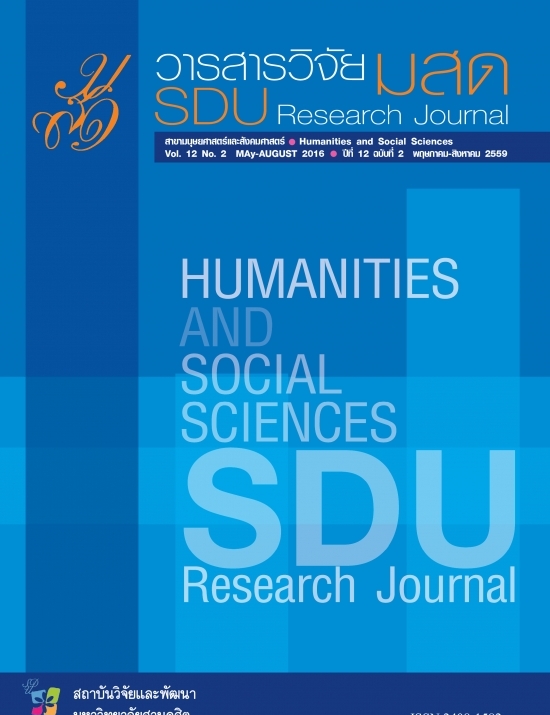แนวทางการปฏิรูปการศึกษาระดับอุดมศึกษาเพื่อรองรับข้อตกลง ประชาคมอาเซียนและแนวโน้มการศึกษาระดับอุดมศึกษาของโลก**
Keywords:
การปฏิรูปการศึกษา, อุดมศึกษา, ข้อตกลงประชาคมอาเซียนAbstract
งานวิจัยมีวัตถุประสงค์ คือ 1) เพื่อกำหนดกรอบตัวบ่งชี้การปฏิรูปการศึกษาระดับอุดมศึกษา
เพื่อรองรับข้อตกลงประชาคมอาเซียนและแนวโน้มการศึกษาระดับอุดมศึกษาของโลก 2) เพื่อศึกษาแนวทาง
การปฏิรูปการศึกษาระดับอุดมศึกษาเพื่อรองรับข้อตกลงประชาคมอาเซียนและแนวโน้มการศึกษาระดับ
อุดมศึกษาของโลกด้วยการวิเคราะห์วางกรอบข้อมูล และ 3) เพื่อศึกษาปัจจัยที่ส่งผลต่อการปฏิรูป
การศึกษาระดับอุดมศึกษา ผลการวิจัย พบว่า 1) ผลการสังเคราะห์กรอบตัวบ่งชี้การปฏิรูปการศึกษาระดับ
อุดมศึกษาเพื่อรองรับข้อตกลงประชาคมอาเซียนและแนวโน้มการศึกษาระดับอุดมศึกษาของโลกจาก
การสังเคราะห์เอกสารของประเทศไทยและต่างประเทศ จำนวน 88 ฉบับ และจากการสัมภาษณ์เชิงลึกผู้มี
ส่วนได้ส่วนเสีย จำนวน 50 คน จาก 5 กลุ่ม (กลุ่มนักศึกษา กลุ่มอาจารย์ กลุ่มผู้บริหาร กลุ่มผู้ใช้บัณฑิต
และกลุ่มศิษย์เก่า) และจากผู้เชี่ยวชาญ 7 คน พบว่า กรอบตัวบ่งชี้ประกอบด้วย 6 องค์ประกอบหลัก
(คุณภาพการศึกษาและสถานศึกษา โอกาสทางการศึกษา ประสิทธิภาพทางการศึกษา ความเป็นสากล
การผลิตบัณฑิตตามความต้องการของตลาดแรงงาน และการมีส่วนร่วมทางการศึกษา) สำหรับการตรวจสอบ
คุณภาพกรอบตัวบ่งชี้การปฏิรูปการศึกษาระดับอุดมศึกษา พบว่า มีความตรงเชิงเนื้อหา ความเหมาะสม
ความเป็นไปได้ และความเป็นประโยชน์ จากการพิจารณาจากผู้เชี่ยวชาญ จำนวน 7 คน และจากการสำรวจ
ความคิดเห็นผู้มีส่วนได้เสีย จำนวน 200 คน 2) ผลการศึกษาแนวทางการปฏิรูปการศึกษาระดับอุดมศึกษา
เพื่อรองรับข้อตกลงประชาคมอาเซียนและแนวโน้มการศึกษาระดับอุดมศึกษาของโลกด้วยการวิเคราะห์วาง
กรอบข้อมูล เก็บรวบรวมข้อมูลจากผู้มีส่วนได้เสีย 5 กลุ่ม จำนวน 1,800 คน พบว่า สถาบันการศึกษาต้อง
วางนโยบายในการปรับเพิ่มคุณภาพการศึกษาและสถานศึกษาโอกาสทางการศึกษา ประสิทธิภาพทาง
การศึกษา ความเป็นสากล การผลิตบัณฑิตตามความต้องการของตลาดแรงงาน และการมีส่วนร่วม
ทางการศึกษาโดยแต่ละสถาบันการศึกษาต้องปรับเพิ่ม 3–5 องค์ประกอบ (7.64–67.44%) และ
3) ผลการวิเคราะห์ตัวแปรที่ส่งผลต่อการปฏิรูปการศึกษาระดับอุดมศึกษาเพื่อรองรับข้อตกลงประชาคม
อาเซียนและแนวโน้มการศึกษาระดับอุดมศึกษาของโลก คือ ความเป็นผู้นำทางวิชาการของผู้บริหาร และ
วุฒิการศึกษาของอาจารย์
References
Education: Content Analysis & Meta Analysis. (Master’s thesis). Srinakharinwirot
University, Bangkok. (in Thai)
Becket, N. & Brookes, M. (2006). Evaluating Quality Management in University Departments.
Quality Assurance in Education, 14 (2), 123.
Berger M. C. & Kostal T. (2002). Financial Resources, Regulation, and Enrollment in US
Public Higher Education. Economics of Education Review, 21(2), 101-110.
Brunori, P., Peragine, V. & Serlenga, L. (2012). Fairness in Education: The Italian University
before and after the Reform. Economics ofEducation Review, 31(5), 764-777.
Bush, T. (2008). Leadership Development and School Improvement: Contemporary Issues
in Leadership Development. Educational Review, 61 (2), 375-389.
Dommeyer, C., Baum, P., Hanna, R. & Chapman, K. (2004). Gathering Faculty Teaching
Evaluations by In-class and Online Surveys: their Effects on Response Rates and
Evaluations. Assessment and Evaluation in Higher Education, 29(5), 611-23.
Higher Education Commission. (2010). Higher Education Strategies toward ASEAN
Community Agreement in 2015. Bangkok: Bangkok Block Ltd. (in Thai)
Konkanchana, S. (2004). A Development of Quality Indicators for Public University.
(Doctoral’s dissertation). Srinakarinwirot University, Bangkok. (in Thai)
Jitsaman, S. (2011). Increasing Research Strategies Corresponding to World Trend. Retrieved
November 18, 2012, from http://www.nstda.or.th/nstda-knowledge/1420-
research-strategy. (in Thai)
Inzai, Y. (2006). An Analysis of Factors Affecting Quality Assurance of Computer and
Information Technology Program According to Administrators’ and Instructors’
Opinions. (Master’ thesis). Faculty of Industrial Education and Technology.
Lauder, H. (2011). Education Economic Globalisation and National Qualifications
Frameworks. Journal of Education and Work. 24(3), 213-221.
Mead, N.R. (1996). Industry-university Partnerships: the Wave of the Future?. Australian
Software Engineering Conference, IEEE Computer Society, Melbourne, Australia.
Retrieved June 4, 2012, from http://csdl.computer.org aswec/1996/7635/
76350141abs.htm.
Mulder, H. (2004). The Intel Research Network: an Innovative Model of Industry-university
Collaboration. Computing Research Association (CRA). Retrieved June 4, 2012,
from http://www.cra.org/CRA/articles/nov02/mulder.html.
Nofstinger, J.B. (2002). Facilitating Economic Development through Strategic Alliances. In
Dotolo, L.G. and Nofstinger, J.B. (Eds.). Leveraging Resources Through Partnerships.
New Directions for Higher Education. No.120. San Francisco: Jossey-Bass.
Puriparinya, K. (2007). Proposed Strategies to Promote Thai Higher Education Institutions
toward World Class Universities. (Doctoral’s dissertation). Chulalongkorn
University, Bangkok. (in Thai)
Quacquarelli Symonds Limited. (2012). QS World University Rankings. Retrieved November
18, 2012, from http://www.topuniversities.com/university-rankings/worlduniversity-
rankings/2012.
Saiti, A. (2012). An Analysis of Three Key Features of the Greek Education System. Quality
Assurance in Education, 20(2), 110 – 138.
Shanahan, P. & Gerber, R. (2004). Quality in University Student Administration: Stakeholder
Conceptions. Quality Assurance in Education, 12(4), 166 – 174.
Sporn, B. (1999). Adaptive University Structures: An Analysis of Adaptation to
Socioeconomic Environments of US and European Universities. Higher Education
Policy. Series 54. London: Jessica Kingsley Publishers
Teamyuan, T. (2005). A Development of an Effective Instructional Model for Bachelor’s
Degree Program in Higher Education Institutes under the Jurisdiction of Fine Arts
Department. (Doctoral’s dissertation). Srinakarinwirot University, Bangkok. (in Thai)
Tsai. (2010). Returns to Overeducation: A Longitudinal Analysis of the U.S. Labor Market.
Economics of Education Review, 29, 606–617.
Wachirapunyapong, R. (2012). Structural Model of Knowledge and Learning Organization to
Quality Assurance of Higher Education Institution. SDU Research Journal
Humanities and Social Sciences, 9(3), 67-80. (in Thai)
Wiratchai, N. & Sunalai, S. (2004). Higher Education Quality in University and Industry
Collaboration. Bangkok: Chulalongkorn University. (in Thai)
Worasan, N. (2007). The Opinions of Students on Quality of Educational Management at
Bachelor’s Degree Level. (Doctoral’s dissertation). Srinakarinwirot University,
Bangkok. (in Thai)
Yinmei, W. M. & Peterson, W. (2007). A Case Study of a Merger in Chinese Higher Education:
The Motives, Processes, and Outcomes. International Journal of Educational
Development, 27(6), 683–696.








